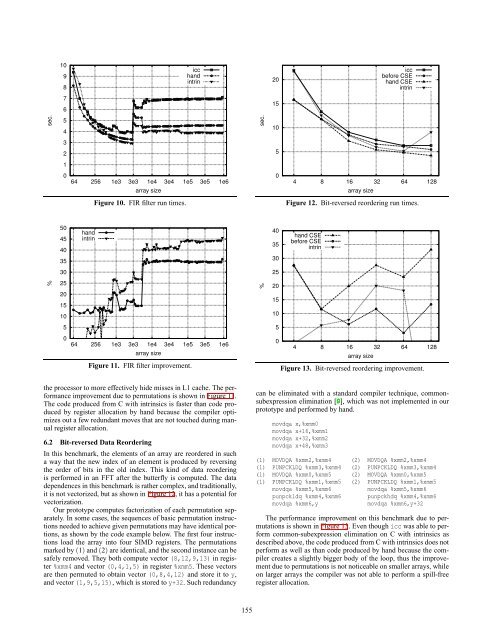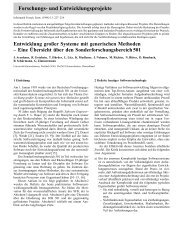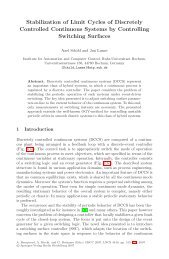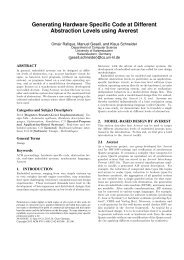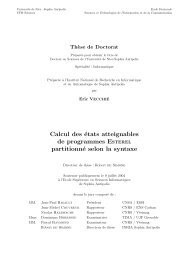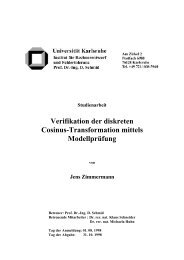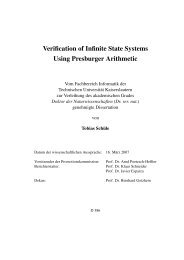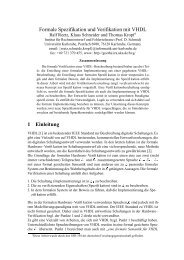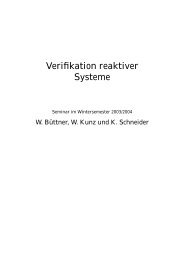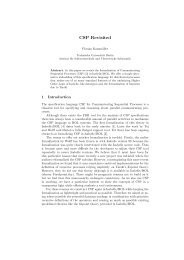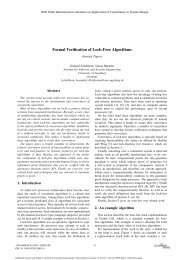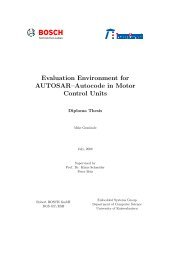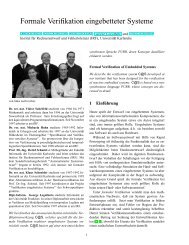Generation of permutations for {SIMD} processors - Embedded ...
Generation of permutations for {SIMD} processors - Embedded ...
Generation of permutations for {SIMD} processors - Embedded ...
Create successful ePaper yourself
Turn your PDF publications into a flip-book with our unique Google optimized e-Paper software.
10<br />
9<br />
8<br />
icc<br />
hand<br />
intrin<br />
20<br />
icc<br />
be<strong>for</strong>e CSE<br />
hand CSE<br />
intrin<br />
7<br />
6<br />
15<br />
sec.<br />
5<br />
4<br />
sec.<br />
10<br />
3<br />
2<br />
5<br />
1<br />
0<br />
64 256 1e3 3e3 1e4 3e4 1e5 3e5 1e6<br />
array size<br />
0<br />
4 8 16 32 64 128<br />
array size<br />
Figure 10. FIR filter run times.<br />
Figure 12. Bit-reversed reordering run times.<br />
50<br />
45<br />
40<br />
35<br />
hand<br />
intrin<br />
40<br />
35<br />
30<br />
hand CSE<br />
be<strong>for</strong>e CSE<br />
intrin<br />
30<br />
25<br />
%<br />
25<br />
20<br />
15<br />
10<br />
%<br />
20<br />
15<br />
10<br />
5<br />
5<br />
0<br />
64 256 1e3 3e3 1e4 3e4 1e5 3e5 1e6<br />
array size<br />
Figure 11. FIR filter improvement.<br />
0<br />
4 8 16 32 64 128<br />
array size<br />
Figure 13. Bit-reversed reordering improvement.<br />
the processor to more effectively hide misses in L1 cache. The per<strong>for</strong>mance<br />
improvement due to <strong>permutations</strong> is shown in Figure 11.<br />
The code produced from C with intrinsics is faster than code produced<br />
by register allocation by hand because the compiler optimizes<br />
out a few redundant moves that are not touched during manual<br />
register allocation.<br />
6.2 Bit-reversed Data Reordering<br />
In this benchmark, the elements <strong>of</strong> an array are reordered in such<br />
a way that the new index <strong>of</strong> an element is produced by reversing<br />
the order <strong>of</strong> bits in the old index. This kind <strong>of</strong> data reordering<br />
is per<strong>for</strong>med in an FFT after the butterfly is computed. The data<br />
dependences in this benchmark is rather complex, and traditionally,<br />
it is not vectorized, but as shown in Figure 12, it has a potential <strong>for</strong><br />
vectorization.<br />
Our prototype computes factorization <strong>of</strong> each permutation separately.<br />
In some cases, the sequences <strong>of</strong> basic permutation instructions<br />
needed to achieve given <strong>permutations</strong> may have identical portions,<br />
as shown by the code example below. The first four instructions<br />
load the array into four <strong>SIMD</strong> registers. The <strong>permutations</strong><br />
marked by (1) and (2) are identical, and the second instance can be<br />
safely removed. They both compute vector (8,12,9,13) in register<br />
%xmm4 and vector (0,4,1,5) in register %xmm5. These vectors<br />
are then permuted to obtain vector (0,8,4,12) and store it to y,<br />
and vector (1,9,5,15), which is stored to y+32. Such redundancy<br />
can be eliminated with a standard compiler technique, commonsubexpression<br />
elimination [9], which was not implemented in our<br />
prototype and per<strong>for</strong>med by hand.<br />
movdqa x,%xmm0<br />
movdqa x+16,%xmm1<br />
movdqa x+32,%xmm2<br />
movdqa x+48,%xmm3<br />
(1) MOVDQA %xmm2,%xmm4 (2) MOVDQA %xmm2,%xmm4<br />
(1) PUNPCKLDQ %xmm3,%xmm4 (2) PUNPCKLDQ %xmm3,%xmm4<br />
(1) MOVDQA %xmm0,%xmm5 (2) MOVDQA %xmm0,%xmm5<br />
(1) PUNPCKLDQ %xmm1,%xmm5 (2) PUNPCKLDQ %xmm1,%xmm5<br />
movdqa %xmm5,%xmm6<br />
movdqa %xmm5,%xmm6<br />
punpckldq %xmm4,%xmm6 punpckhdq %xmm4,%xmm6<br />
movdqa %xmm6,y<br />
movdqa %xmm6,y+32<br />
The per<strong>for</strong>mance improvement on this benchmark due to <strong>permutations</strong><br />
is shown in Figure 13. Even though icc was able to per<strong>for</strong>m<br />
common-subexpression elimination on C with intrinsics as<br />
described above, the code produced from C with intrinsics does not<br />
per<strong>for</strong>m as well as than code produced by hand because the compiler<br />
creates a slightly bigger body <strong>of</strong> the loop, thus the improvement<br />
due to <strong>permutations</strong> is not noticeable on smaller arrays, while<br />
on larger arrays the compiler was not able to per<strong>for</strong>m a spill-free<br />
register allocation.<br />
LCTES’05, 9 2005/4/16<br />
155


